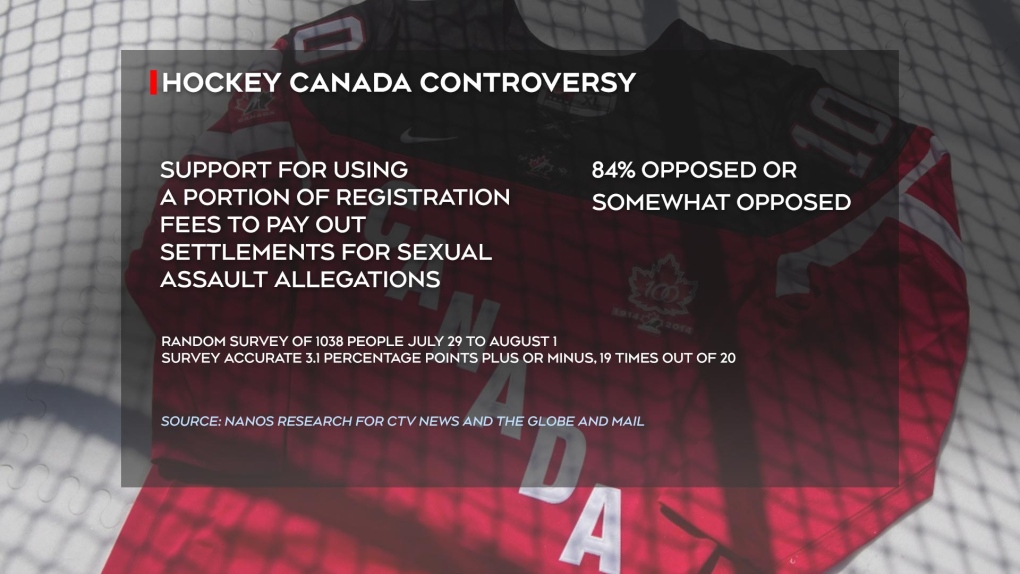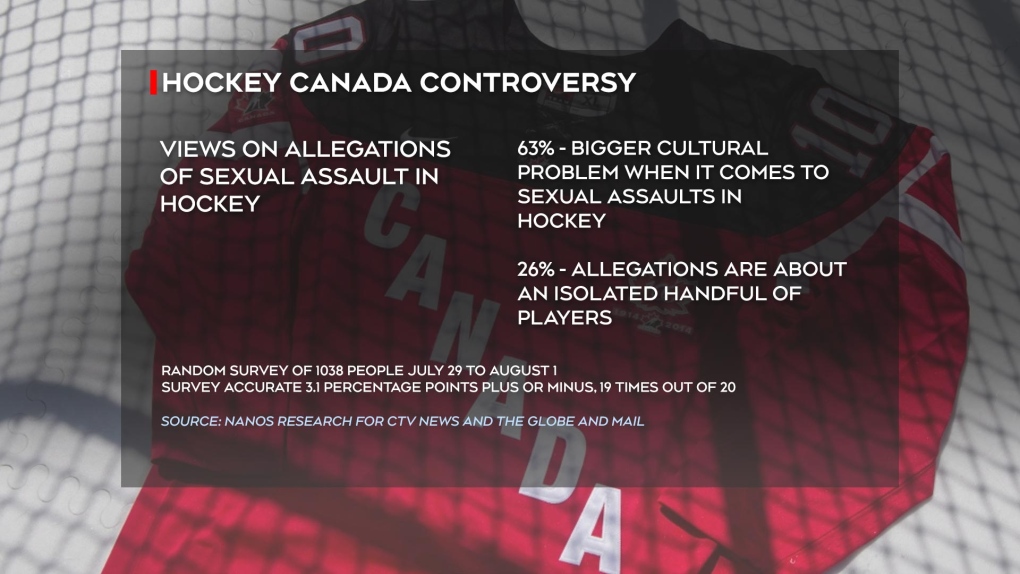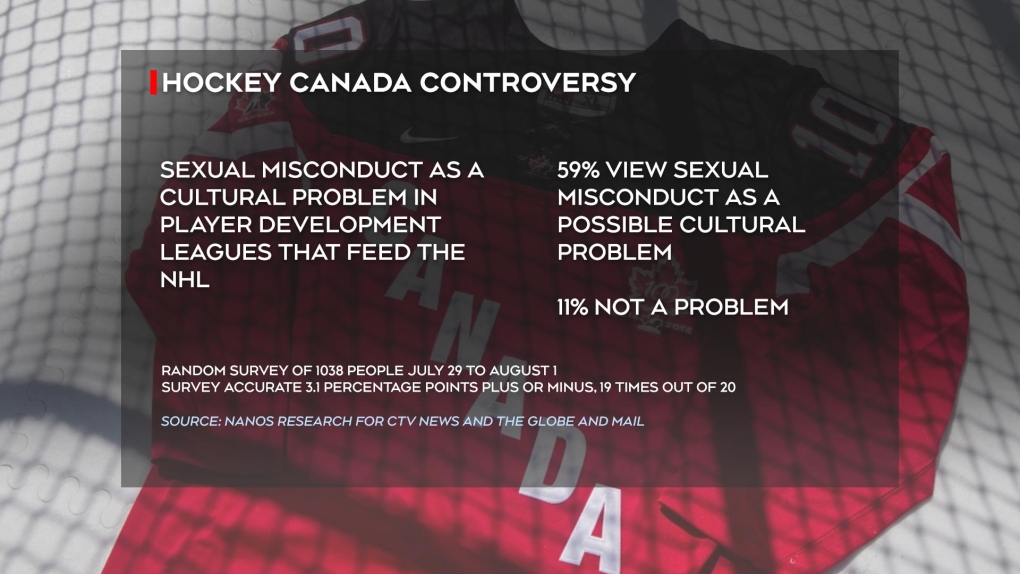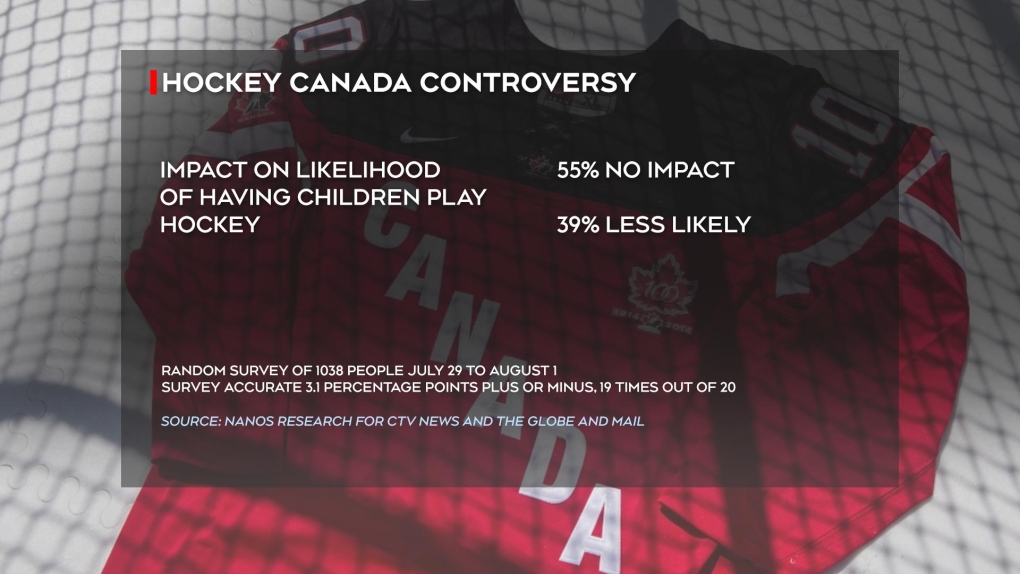Canadians opposed, angry over Hockey Canada’s use of player registration fees in settlements, survey finds
A new survey by Nanos Research is shedding light on the impact Hockey Canada’s handling of sexual assault allegations is having on the organization and the sport.
A majority of Canadians said they feel angry a portion of player registration fees were used by Hockey Canada to maintain a fund for uninsured payments, including for sexual assault settlements.
“When you’re paying fees you’re hoping that it’s going towards things that are directly benefiting the children and obviously that doesn’t benefit the children,” said Marcia Novo, a hockey parent of three sons from The Pas, Man.
The survey of 1,038 people commissioned by CTV News and The Globe and Mail found 84 per cent were opposed or somewhat opposed to using a portion of fees to pay out settlements for sexual assault allegations.
 Data from a Nanos Research poll asking if people support Hockey Canada's decision to use a portion of registration fees to pay settlement for sexual assault allegations
Data from a Nanos Research poll asking if people support Hockey Canada's decision to use a portion of registration fees to pay settlement for sexual assault allegations
Seventy-three per cent said they feel anger about the situation.
“It’s really a non-starter for most Canadians,” Nik Nanos, of Nanos Research, told CTV News Channel Friday.
Hockey Canada just announced a governance review and has already vowed to stop using fees to pay settlements.
The way it handled group sexual allegations made against some members of the 2018 Canadian World Junior hockey team, a lawsuit the organization settled in May with the woman who came forward before fully investigating the matter, has also come under scrutiny.
 Data from a Nanos Research poll looking at views on allegations of sexual assault in hockey
Data from a Nanos Research poll looking at views on allegations of sexual assault in hockey
“It suggests that this particular issue is a major issue and that it has had a materially negative impact on how Canadians view hockey players and it’s quite significant considering how important hockey is to Canadians,” Nanos told CTV News Channel.
Fifty-nine per cent of respondents said they view sexual misconduct as a possible cultural problem in player development leagues that feed the NHL while only 11 percent said it’s not a problem.
 Data from a Nanos Research poll asking if sexual misconduct is a cultural problem in hockey.
Data from a Nanos Research poll asking if sexual misconduct is a cultural problem in hockey.
Women, meantime, were more likely than men to view sexual misconduct as a problem in hockey.
“It just feels like it is very ingrained in the culture of hockey,” Novo said.
Other hockey parents CTV News spoke to in Winnipeg Friday said while they’re not happy the way their fees were used and want more transparency from Hockey Canada, they have no plans to take their kids out of the game because it’s a sport they love and enjoy.
Fifty-five per cent of survey respondents said it will have no impact on the likelihood of having their children play hockey while 39 per cent said they’re less likely to sign up their kids.
 Data from a Nanos Research poll asking the impact Hockey Canada allegations would have on parents enrolling their children in hockey
Data from a Nanos Research poll asking the impact Hockey Canada allegations would have on parents enrolling their children in hockey
Daryl Fowler, president of Hockey Winnipeg, said there needs to be more transparency about where the money Hockey Canada collects is going and if there’s not, Hockey Winnipeg may look at options for holding back the fees sent to the organization.
“We know that everybody’s discussing it when everybody gets together and it’s an issue that’s gotta get resolved,” Fowler said. “Hockey’s a great game and it’s kind of giving it a black eye right now.”
Novo said she won’t pull her sons from playing hockey but wants to see the culture of the game changed.
“That’s where I think I need to do the work,” Novo said. “It’s where a lot of parents need to do the work is that we can no longer condone this behaviour and maybe we have to speak up against it.”
Something she thinks needs to happen at a local level, to root out any problems when players are just getting started in the game.
Hockey Manitoba said Friday it’s holding an annual meeting of its board of directors this weekend and may have more to say on the issue Monday.
Random survey of 1,038 people from July 29 to August 1
Survey accurate 3.1 percentage points plus or minus, 19 times out of 20
Source: Nanos Research for CTV News and The Globe and Mail
CTVNews.ca Top Stories

Budget 2024 'likely to be the worst' in decades, former BoC governor says
Without having seen it, former Bank of Canada governor David Dodge believes that Tuesday's 2024 federal budget from Deputy Prime Minister and Finance Minister Chrystia Freeland is 'likely to be the worst budget' in decades.
What's at stake for Canada after Iran's unprecedented attack on Israel
Following the Iranian missile and drone strikes against Israel over the weekend, Canada should take the threat of Iran and potential escalation of the conflict seriously, one global affairs analyst says.
Former B.C. school trustee's 'strip-tease artist' remark was defamatory, judge rules
A controversial former school trustee from B.C.'s Fraser Valley who described a political rival as a "strip-tease artist" during an election campaign has been ordered to pay her $45,000 for defamation.
'A sense of urgency': Sask. man accused of abducting daughter calls himself to the stand during trial
Michael Gordon Jackson, the man on trial after being charged with contravention of a custody order for allegedly abducting his daughter in late 2021 to prevent her from getting a COVID-19 vaccine, called himself to the stand Monday.
Kingston, Ont.'s Aaliyah Edwards drafted into WNBA
After four years at the University of Connecticut, Edwards was selected sixth overall by the Washington Mystics in the WNBA draft Monday night.
NASA confirms mystery object that crashed through roof of Florida home came from space station
NASA confirmed Monday that a mystery object that crashed through the roof of a Florida home last month was a chunk of space junk from equipment discarded at the International Space Station.
A knife attack in Australia against a bishop and a priest is being treated as terrorism, police say
Horrified worshippers watched online and in person as a bishop was stabbed at the altar during a church service in Sydney on Sunday evening.
Body of 14-year-old boy pulled from Lake Ontario, police say he drowned while swimming
The body of a 14-year-old boy has been pulled from Lake Ontario after police say he drowned while swimming near Ashbridges Bay Park on Sunday night.
'Rust' armourer gets 18 months in prison for fatal shooting by Alec Baldwin on set
A movie weapons supervisor was sentenced to 18 months in prison in the fatal shooting of a cinematographer by Alec Baldwin on the set of 'Rust.'
































